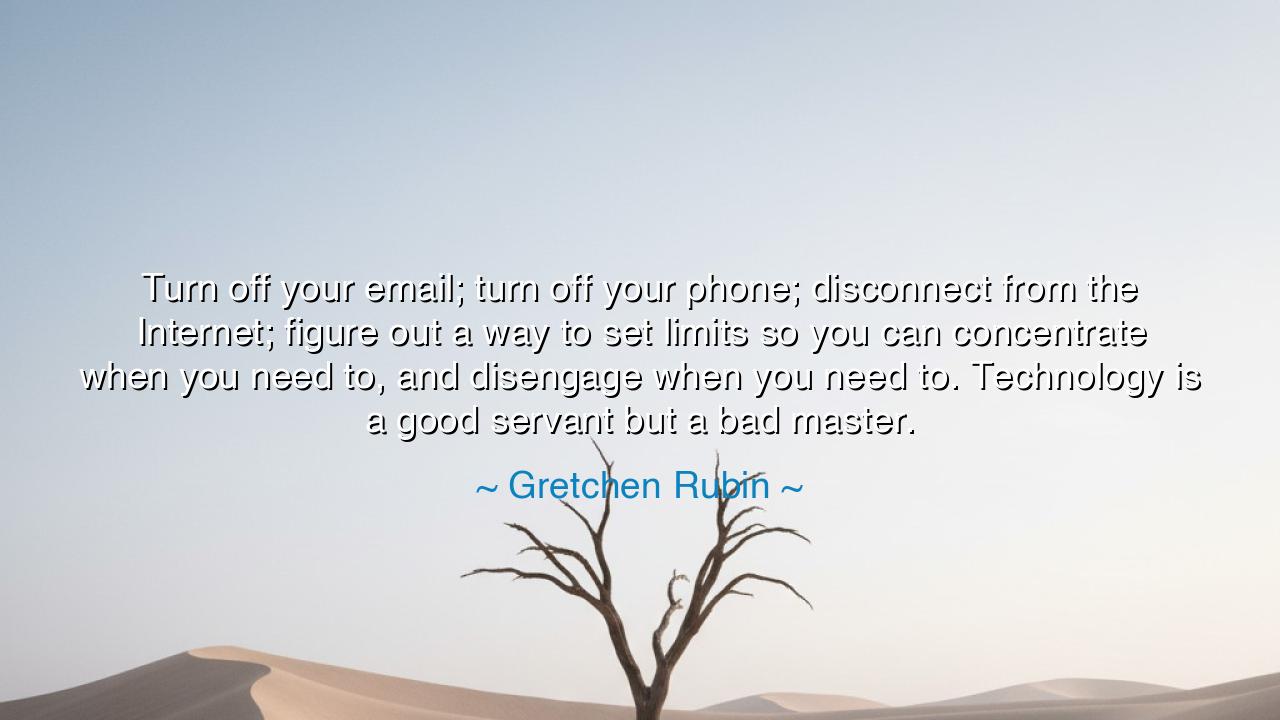
Turn off your email; turn off your phone; disconnect from the
Turn off your email; turn off your phone; disconnect from the Internet; figure out a way to set limits so you can concentrate when you need to, and disengage when you need to. Technology is a good servant but a bad master.






Hear the words of Gretchen Rubin, wise observer of the modern soul, who declared: “Turn off your email; turn off your phone; disconnect from the Internet; figure out a way to set limits so you can concentrate when you need to, and disengage when you need to. Technology is a good servant but a bad master.” In these words, she speaks not only of tools, but of freedom. For technology, which once promised liberty and efficiency, has become a chain to many, binding their eyes to glowing screens and their hearts to constant noise. Rubin’s voice calls us back to mastery—to remember that we command the tools, and not the other way around.
The origin of this wisdom lies in the rhythm of our present age. Never before have men and women been so surrounded by instant messages, endless updates, and voices from afar. The phone, the email, the Internet—these instruments were born to serve, to lighten burdens and shorten distances. Yet when used without measure, they enslave the very ones they were meant to help. The servant rises against the master, and the mind grows weary, scattered, incapable of silence. Thus Rubin, like a prophet in a busy marketplace, cries: “Set limits, or you shall be ruled!”
The ancients, though without our machines, understood the peril of being mastered by one’s own creations. The tale of the sorcerer’s apprentice reminds us: when the broom was commanded to fetch water, it obeyed too well, flooding the house, for the master had not learned how to stop it. So it is with technology—it obeys us swiftly, but if we do not know how to command it wisely, it drowns us in abundance. What was meant to refresh the soul instead leaves it gasping.
Consider the life of Winston Churchill. In the days of war, when messages and information pressed upon him without ceasing, he carved for himself sacred hours of silence, retreating into painting, writing, and rest. He knew that to lead effectively he must master the flood of words and commands. In him we see Rubin’s principle embodied: a man who ruled information rather than being consumed by it. This same wisdom must be practiced now, when the flood is not from telegrams but from the ceaseless tide of digital notifications.
Rubin’s warning is also an exhortation: technology is not the enemy. It is, as she declares, a good servant. The ability to speak across oceans, to access libraries in a moment, to carry the wisdom of the ages in a pocket—these are marvels. But when the servant becomes a tyrant, when concentration is shattered and rest is stolen, the gift becomes a curse. To master it is to use it with intention: to choose when to listen, when to answer, when to silence.
What, then, is the meaning of her words? They remind us that freedom is not only political or economic—it is also personal, the freedom of attention, the sovereignty of the mind. He who cannot turn off his phone is not free. She who cannot close her email is not master of her own time. To reclaim patience, silence, and concentration, one must learn to disconnect, to remember that life is more than the hum of machines.
The lesson for future generations is plain: discipline is the safeguard of freedom. Do not wait for technology to enslave you—set boundaries now. Turn off the device when you must work; silence the noise when you must rest; disconnect when you must hear the voice of your own heart. For in these limits lies mastery, and in mastery lies peace.
Therefore, let your actions be thus: each day, carve out time where no screen calls to you, where the mind may breathe. Learn to use your tools wisely, to bend them toward service. And remember always Rubin’s wisdom: technology is a good servant but a bad master. Rule your tools, and you will be free. Let them rule you, and you will be enslaved, not by iron chains, but by endless distraction. Choose, then, to be the master.






AAdministratorAdministrator
Welcome, honored guests. Please leave a comment, we will respond soon